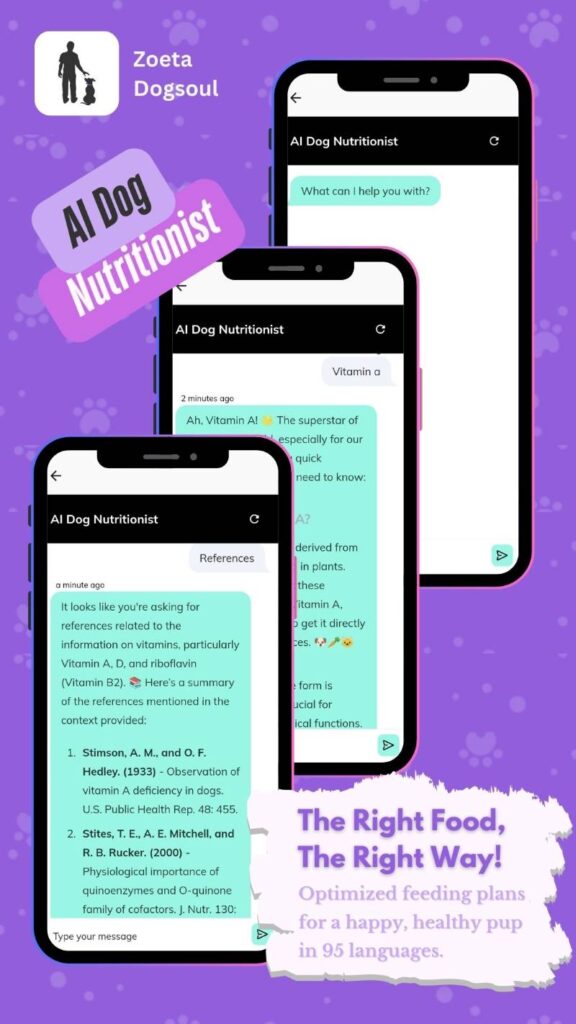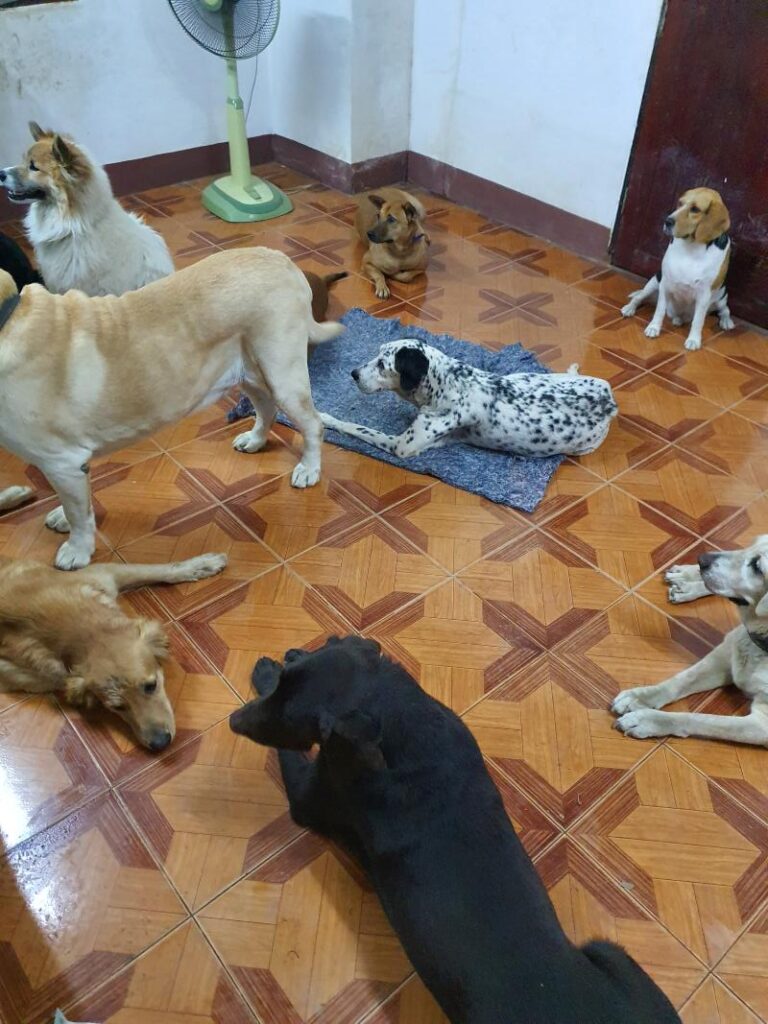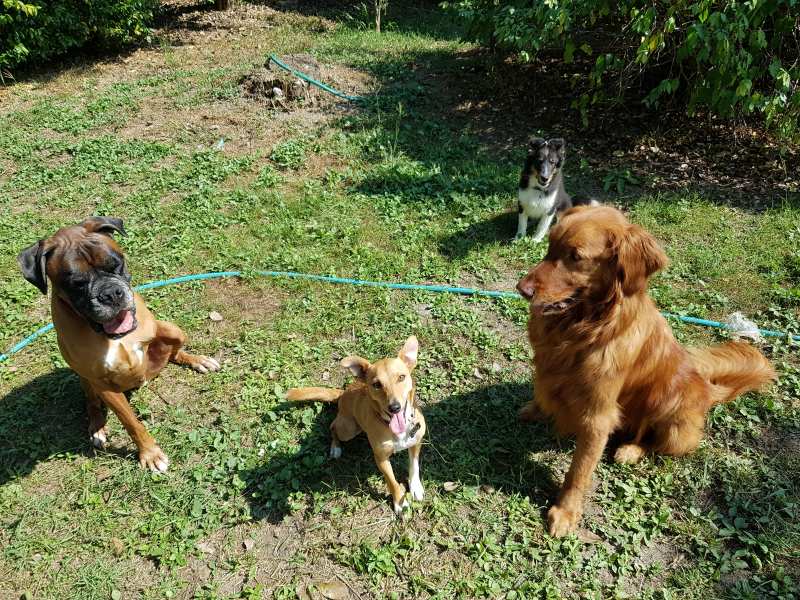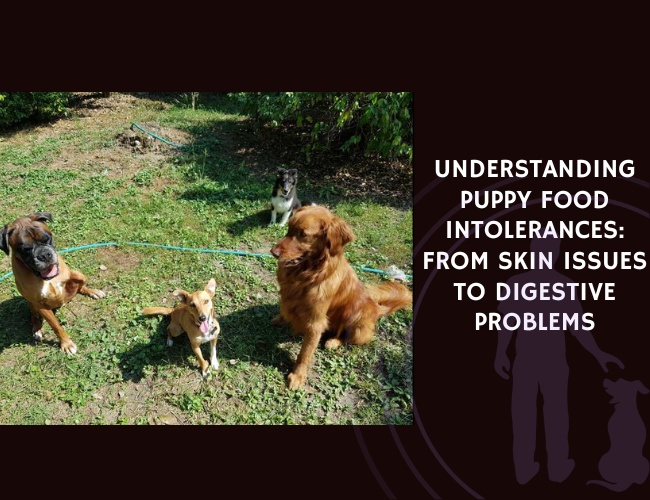Introduction: What Are Food Intolerances in Puppies?
What does food intolerance mean for puppies?
When your puppy’s tummy rumbles after mealtime, you might wonder if it’s just normal puppy behavior. But sometimes, certain foods can cause more than just a little digestive upset. Food intolerance in puppies is a reaction that doesn’t involve the immune system. It often happens because your puppy’s body struggles to digest or process specific ingredients. This is different from a food allergy, which is an immune reaction that can be more severe and dangerous.
Food intolerance is usually due to enzyme deficiencies or sensitivities to certain food components. For example, if a puppy lacks the enzymes needed to digest lactose (found in dairy), you may notice symptoms after consuming milk or cheese. Unlike allergies, which can trigger intense immune reactions, intolerances typically cause milder but persistent problems over time.
Why early detection matters 🕵️♂️
Puppies grow fast and need plenty of nutrients. If your puppy can’t tolerate certain foods, this can lead to tummy troubles and poor absorption of essential vitamins and minerals. If left unchecked, it may even slow down healthy development. Early detection helps ensure your puppy grows strong and happy. It also reduces the risk of other health problems like nutritional deficiencies or even future allergies.
Common signs might include diarrhea, vomiting, restlessness, or changes in appetite. Some puppies may become irritable or obsessed with licking their paws—a subtle clue worth noting!
How common is food intolerance in puppies?
Food intolerances are more widespread than many pet parents realize. Young puppies can be especially sensitive as their digestive systems develop. Common triggers include proteins like beef, chicken, or dairy, as well as grains or artificial additives found in some puppy foods. Noticing these challenges early is vital to helping your puppy thrive and enjoy mealtime again.
Now that we’ve uncovered what food intolerances are and why they matter, let’s shift our focus to the early warning signs you may spot in your puppy’s digestive health.
Spotting the Signs: Gastrointestinal Symptoms
Recognizing digestive distress
Food intolerance often makes its debut in puppies as digestive problems. Puppies are growing fast and their digestive systems are still maturing, so even small food issues can quickly turn into big discomfort. Common signs to look out for include diarrhea, vomiting, and bloating. These problems can be quite noticeable, so don’t ignore if your puppy suddenly seems off after a meal.
Sometimes, a puppy might have softer stool for a day, but repeated diarrhea is a red flag. Vomiting isn’t just about the occasional spit-up; it can include frequent regurgitation or bringing up food after every meal. Bloating—an uncomfortable swollen belly—might not seem serious at first, but it points to trouble digesting food or even a reaction to certain ingredients. Keeping a daily log of your puppy’s bathroom habits can help spot patterns early.
Warning signs: irregular stools and excessive gas
Not all symptoms are dramatic. Many puppies with food intolerances have irregular stool patterns. One day it might be firm, but mushy or liquid the next. Watch for color and consistency changes, and take note if the stool has mucus or blood.
Excessive gas is another key warning sign. Puppies naturally pass a bit of gas, but if your puppy seems unusually gassy, especially with an upset stomach, it could mean trouble digesting certain foods. Smelly, frequent gas paired with discomfort or a rumbly tummy deserves attention.
Puppies vs. adult dogs: What’s different?
While some symptoms show up in both puppies and adults, young dogs are more sensitive due to their developing systems. Diarrhea and vomiting in puppies can lead to dehydration quickly, affecting their growth and energy. Adult dogs might tolerate some ingredients better, so a puppy’s body reacts much faster and more intensely to food troubles. This means action is needed promptly for puppies—don’t wait and see.
Being alert to these signs can help you protect your puppy from long-term health problems. Spotting digestive difficulties early not only helps your puppy feel better but can prevent other issues from popping up down the road.
Next, we’ll look at how food intolerance can show up beyond the digestive tract—in your puppy’s skin and coat.
Beyond the Gut: Skin and Coat Issues
Recognizing skin and coat symptoms in puppies
Food intolerances in puppies don’t just impact the digestive system—they can also show up as problems with the skin and coat. If you’ve noticed your pup scratching more than usual, developing red or inflamed skin, or losing patches of fur, it’s definitely time to pay attention. These dermatological signs are often among the first visible hints that something in your puppy’s diet is not agreeing with them. Excessive itching and persistent redness might be mistaken for common conditions like flea allergies or dry skin, but if these signs are ongoing, a hidden food intolerance could be the culprit.
Recurrent ear infections—an overlooked clue
One symptom that often surprises puppy owners is recurring ear infections. If your pup’s ears are frequently red, smelly, or have a brownish discharge, it may be more than just unlucky genetics or playing in the mud. Chronic ear infections can result from the same underlying food intolerance triggering skin issues elsewhere on the body. This happens because inflammation caused by certain foods doesn’t always stay in the gut—it can express itself in sensitive skin inside the ears.
Understanding the gut-skin connection
How does food cause skin trouble? It all comes down to the “gut-skin axis.” When a puppy’s digestive system reacts badly to certain foods, the resulting inflammation and imbalance in gut bacteria can send distress signals through the bloodstream. These signals often show up as skin problems, such as dandruff, hot spots, or fur that looks dull and lifeless. This is why puppies with food sensitivities sometimes develop both tummy troubles and skin issues—the two are more closely linked than most people think.
Spotting these symptoms early is key to helping your puppy feel their best. When skin or ear problems crop up alongside digestive upsets, it’s time to connect the dots and consider a possible food intolerance. Addressing the root cause can bring relief and restore your puppy’s shiny coat and playful spirit.

Behavioral Changes: Is Your Puppy Trying to Tell You Something?
Unusual behaviors as warning signs
It’s easy to spot a happy, playful puppy. But what if your puppy starts acting out of sorts, appearing restless or irritable? Food intolerances can sometimes go beyond tummy upsets or itchy skin. They can also affect how your puppy behaves. Some puppies may become fidgety, finding it hard to relax or sleep peacefully. Others might seem more grumpy, especially during or after mealtimes.
One common sign is obsessive licking, often of the paws. This repetitive action isn’t just a quirk—your puppy may be trying to comfort an upset system, or trying to soothe discomfort from inside or out. You might also notice more chewing or scratching at things (or themselves), signaling unease or distress that isn’t linked to boredom or play.
Appetite and eating habits
Changes in how—and how much—your puppy eats can also provide important clues. Some puppies with food intolerances lose interest in their meals, while others might eat only certain foods or refuse previous favorites. A puppy might seem hungry but quickly stop eating, as if the food is causing discomfort once tasted. Alternatively, your puppy might raid the trash or become fixated on non-food items, acting out a need their current diet isn’t meeting. These shifts can be subtle but are impactful, especially if paired with other symptoms.
Energy and mood shifts
If your typically bubbly puppy becomes more lethargic, or if their playfulness transforms into crankiness, these could be early hints of a dietary issue. Puppies with food intolerance might appear less social, sleep more, or have shorter bursts of energy than before. You may even see a decrease in their overall enthusiasm for play or training.
Just like in people, feeling unwell due to food can impact a puppy’s entire mood. Irritation or discomfort may cause them to withdraw or become less tolerant with family and other pets. These signals, though easily missed, are often the first way your puppy lets you know something’s off.
Paying attention to these behavioral clues helps you respond before more serious signs appear. By listening to your puppy’s actions, you can work towards keeping them happy and thriving.
Food Intolerance vs. Food Allergy: Understanding the Difference
What sets food intolerance apart from food allergy?
When your puppy reacts poorly to something in their bowl, it’s easy to assume it’s an “allergy.” However, food intolerance and food allergy are quite different, both in how they happen and how they affect your puppy.
Food intolerance is a non-immune reaction. This means your puppy’s body struggles to digest or process certain food components. This struggle isn’t because the body thinks the food is dangerous but often because it’s missing the right enzyme or has trouble handling an ingredient. Think of lactose intolerance as an example—puppies lacking enough lactase enzyme can’t digest dairy well, leading to bloating or diarrhea. Food intolerance mostly shows up as tummy troubles, changes in poop, or even behavioral shifts.
On the other hand, a food allergy involves the immune system. With allergies, the immune system wrongly tags a harmless food protein (like chicken or wheat) as a threat. This sets off a chain reaction. Allergies can lead to symptoms like skin rashes, swelling, or even more severe reactions. So, allergies are about immune battles, while intolerances are about digestive hiccups.
Enzyme deficiencies: The hidden driver of intolerance
Let’s break it down a bit more. Puppies with food intolerance often have enzyme deficiencies. Enzymes are tiny helpers in the gut that break down food into nutrients. Without the right enzyme, food stays undigested, leading to stomach upset, gas, and discomfort. Over time, this can affect your puppy’s growth and happiness.
The gut microbiome: An invisible influencer
Your puppy’s digestive system is home to millions of good bacteria—this is called the gut microbiome. These bacteria play a key role in both tolerance and allergic reactions. If the microbiome is balanced, the gut may handle different foods with no trouble. But when something disrupts this balance—like early exposure to triggers or illness—the risk of intolerance or even new allergies can go up. Puppies with a struggling microbiome often end up with more food reactions, gut inflammation, or even ongoing sensitivities as they grow.
Understanding these differences is important for helping your puppy feel their best, especially as you explore what ingredients might make them feel unwell or happy.
Triggers. Symptoms. Relief.
When food hurts, the signs aren’t always obvious.
Puppies with food intolerances may seem fine—until the itching starts, the stool softens, or energy dips. These reactions build up quietly but signal a deeper issue.
From belly to behavior, intolerance leaves clues.
Digestive upsets, skin irritation, ear infections, or even obsessive paw licking—these aren’t quirks, they’re cries for help. Spotting patterns early prevents long-term health issues.



Support starts with understanding.
By identifying triggers and creating a tailored diet, you’ll not only ease discomfort but help your puppy grow with strength, balance, and confidence.
Common Culprits: Ingredients That Trigger Intolerances
Animal protein triggers
One of the most common causes of food intolerance in puppies is animal protein. While proteins are essential for healthy growth, some puppies have trouble digesting common types. The leading culprits include beef, chicken, lamb, and even dairy products. When puppies struggle to break down these proteins, it can lead to digestive issues like diarrhea, vomiting, or bloating, as well as skin problems and irritability. Animal protein intolerance is not the same as an allergy. Here, it’s often an enzyme deficiency or sensitivity that prevents proper digestion, not an immune reaction.
Grain sensitivities
Grains are another frequent trigger. Ingredients like wheat, corn, and soy are used in many commercial puppy foods. While some puppies tolerate these grains just fine, others may develop stomach upset, inconsistent stools, or excessive gas. Grain intolerance tends to show up early in a puppy’s life and is often linked to difficulties digesting the complex carbohydrates or proteins found in grains. Remember, grain intolerance in puppies is usually a digestive issue, not an immune response.
Additives and preservatives
Commercial puppy foods sometimes contain a range of artificial ingredients, such as colorings, preservatives, or flavor enhancers. Sensitive puppies may react to these additives with gastrointestinal discomfort, skin rashes, or changes in behavior. These reactions can be frustrating for both puppies and their humans. Sometimes, it’s not always the main protein or grain, but a hidden ingredient causing the trouble. Monitoring ingredient lists and choosing foods with minimal additives can help reduce reactions.
Understanding these common culprits is essential for spotting patterns and making informed choices about your puppy’s diet. Being aware of these triggers puts you in a strong position to support your puppy’s comfort and wellbeing through thoughtful dietary decisions.
Diagnosing Food Intolerances in Puppies
Pinpointing the problem: The elimination diet approach
Diagnosing food intolerances in puppies isn’t always a straightforward task. Every puppy is unique, and symptoms can vary from obvious tummy upsets to skin issues or even changes in mood. One widely used method is the elimination diet. This means all possible trigger ingredients are removed from your puppy’s meals. Instead, you give a simple, limited diet for a set period—usually six to twelve weeks. If your puppy’s symptoms improve, foods are then slowly reintroduced, one at a time. When symptoms flare up after a new ingredient is added, this helps map out which foods cause issues. It’s a gentle and careful puzzle, but the insights can be invaluable for your growing companion.

Special diets: Hydrolysed and novel proteins
Some puppies need an even more tailored approach. Your veterinarian might recommend hydrolysed protein diets, where proteins are broken into tiny fragments. This makes it less likely for your puppy’s body to react badly, as these pieces are too small to trigger most food sensitivities. Another method uses novel proteins—ingredients your puppy hasn’t eaten before, like duck or venison. These diets help avoid common triggers while giving your puppy the nutrients they need to thrive.
Veterinary teamwork: Exclusion and provocation testing
It’s important to work alongside your veterinarian during this journey. Together, you’ll plan exclusion and provocation trials. Here, you remove potential culprits, then carefully reintroduce them under supervision. Some commercial intolerance tests claim a quick fix, but they can lack reliability, so the tried-and-true diet trial remains the gold standard. This teamwork ensures your puppy’s health always comes first, and every decision is backed by expert guidance.
With careful observation and a structured plan, you’ll be one step closer to helping your puppy feel their best. Food can be a source of joy for your little friend—not discomfort! 😊
Treatment Approaches: Managing Your Puppy’s Diet
Building a tailored diet plan
Once you’ve discovered your puppy has a food intolerance, it’s natural to feel a little worried. Rest assured, managing your puppy’s diet can help them live a comfortable, happy life. The first step is to create a dietary management plan that suits your puppy’s unique needs. This often means working with your veterinarian to identify which ingredients or components are causing trouble. Hydolyzed protein foods—where proteins are broken down into smaller pieces—are popular because they’re less likely to cause reactions. Novel proteins, like duck or fish, may be used if your puppy hasn’t eaten them before, reducing the risk of triggering symptoms.
Elimination diets are also key. These involve removing all potential irritants and slowly reintroducing foods one at a time. If symptoms improve and then return when a specific food is added back, you’ve likely found the culprit. The process may take a few weeks but is worth the effort for your puppy’s long-term health.
Balancing restrictions with growth needs
Puppies are growing fast, so it’s important that their restricted diet still meets all their nutritional requirements. Cutting out common proteins or grains can make it trickier—but not impossible—to ensure they get enough nutrients for healthy development. Your veterinarian can help you find specialized puppy formulas or supplements that provide the right balance, even when certain foods must be avoided. Keep in mind that a well-planned diet not only manages intolerances but also supports gut health, immune function, and strong bones.
Monitoring and adapting over time
Watching your puppy for changes is a big part of diet management. Are diarrhea or skin problems fading? Is their energy back? Regular check-ins with the veterinarian can track weight, growth, and overall condition. If new symptoms pop up, or old ones return, it might mean another food ingredient needs to be removed or adjusted. Puppies’ needs can change as they get older, so flexibility is key.
When cared for attentively, most puppies with food intolerances lead healthy, active lives. Adjusting their food early and monitoring their response lay a strong foundation for future well-being.
Long-term Health Implications of Untreated Intolerances
Risks of nutritional deficiencies
Leaving a puppy’s food intolerance unaddressed can result in more than just an upset tummy. Puppies need a balanced diet during growth, and ongoing reactions to certain foods can throw off their ability to get vital nutrients. This happens in two major ways: either the diet becomes too limited because problematic foods are avoided, or the puppy’s digestive system struggles to absorb nutrients properly.
When puppies can’t digest or absorb what they need—such as protein, vitamins, and minerals—they can develop deficiencies. Signs might include poor growth, lack of energy, or a dull coat. Over time, this can weaken a puppy’s immune system and stunt development, making them more susceptible to other illnesses. 🩺
Chronic gut inflammation and intestinal damage
Intestinal trouble isn’t just uncomfortable—it can become chronic. When the gut is exposed to foods it cannot handle, ongoing inflammation may occur. Chronic gut inflammation can damage the intestinal lining, leading to a condition called “leaky gut.” This allows harmful substances to pass through the gut wall and into the bloodstream, causing further health challenges.
Damage like this often becomes a cycle, where inflammation makes the gut less able to heal and even more sensitive. This can result in recurring diarrhea, vomiting, and discomfort, affecting your puppy’s overall happiness and wellbeing.
Potential for future food allergies
Another crucial risk of ignoring early food intolerance is that it may lead to food allergies. Studies suggest that early inflammation and gut damage can disrupt the body’s ability to distinguish between harmless and threatening substances. This lowers “oral tolerance,” making the immune system more likely to react to new foods and develop allergies later in life.
While this might sound concerning, being aware of these risks helps you take timely action to support your puppy’s long-term health. Working with a veterinarian and closely watching your puppy’s symptoms are practical steps to keep them thriving every step of the way.
Preventive Strategies and Future Outlook
Building a healthy gut early on
Setting your puppy up for success starts with what goes into their bowl. Early dietary choices have a big impact on gut health, shaping their ability to digest food, absorb nutrients, and avoid intolerances. Offering a simple, high-quality diet with easy-to-digest proteins and minimal additives can support gut development. Some puppies benefit from hydrolysed or novel protein diets, especially if they’re showing early sensitivity. Starting with less common ingredients helps reduce the risk of reactions before they happen.
Nutrition isn’t only about right now—it’s about keeping that tiny tummy happy for years. Puppies need the right balance of protein, fat, vitamins, and minerals to grow. If your vet suggests any restrictions, they’ll work with you to ensure your puppy still gets everything they need. Regular check-ins can catch early warning signs before they become big problems.
Advances in puppy nutrition and research
Puppy nutrition is always evolving. Recent research highlights the importance of the gut-brain-skin axis—a fancy way of saying that gut health can affect not just digestion, but also mood and skin. Specialized puppy foods now focus on gentle proteins and carefully chosen carbs to avoid common irritants like beef, wheat, or artificial colors. Some brands even design formulas for sensitive pups, using innovative protein sources and beneficial probiotics to boost good bacteria in the gut.
Researchers are also exploring how early gut care may help prevent food allergies and other long-term issues. The more we learn, the better the tools we have to protect puppies from discomfort.
Working with pet professionals
You’re not alone on this journey! Veterinarians and pet nutritionists can help you craft an optimal diet plan. They may recommend elimination trials, regular growth checks, and subtle dietary tweaks. If challenges arise, a professional’s guidance makes it easier to keep your puppy happy and thriving.
Acting early and staying proactive is key. Paying attention to your puppy’s reactions can help catch potential problems before they impact long-term health.










